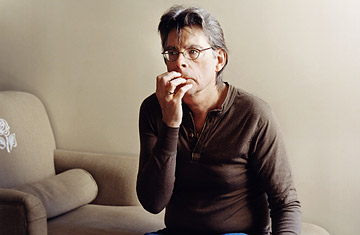
"Creativity is a road out of misery," says King of his work
For a time, it looked as if Stephen King would never reach retirement age. Nine years ago, a pickup truck slammed into him on the side of a Maine road. One of his legs shattered, a lung collapsed, several ribs broke and his hip fractured. A few years later, after developing a severe case of pneumonia, the king of chills decided to embrace warmth. "It's the law," he jokes from his part-time home on the Gulf Coast. "You get a little bit older, and you have to move to Florida." So, in one of the rare cliché moments of his life, King, 60, and his wife Tabitha flew south for the winter.
Duma Key, his first novel set in Florida, inevitably followed. Named after a fictional reef, it concerns Edgar Freemantle, a wealthy man who loses his right arm in a construction accident and moves to a lonely island that seems to grant him the power to paint surreal, sometimes premonitory images. At its core, the book is about creativity and its relationship to physical and mental healing—King's continuing attempt to address his own mortality years after his near death.
But with its sun-blasted beaches and tranquil coastlines, what could possibly be frightening about Florida? "The actual environment down here is a bit scary in that everything grows everywhere all the time," King says. "I don't think it's any accident that when I had the idea for the book, I was walking down the side of a road, it was getting dark, and I was literally entombed in foliage—big rhododendron bushes, like 20 feet high."
So has he abandoned his home turf? "I've written all these books about Maine simply because it's what I know," he says. And he didn't know the Gulf Coast, which is why it took him almost a decade to write about it. "You have to know where the roads go and what the names of the plants are," he says. Hence his self-imposed literary exile from Maine streets. "I thought, if you're going to make a break, why not make a complete break?"
Duma, with its maimed painter, follows Lisey's Story, his 2006 literary novel about a writer's widow. And while both books are concerned with the death or near death of an artist, King brushes aside the idea that any of it is autobiographical. He's already done that. "When I wrote about my accident in [2000's] On Writing, I wrote about something that actually happened," he says. "With some of these later books, I'm trying to write about what it means, how that kind of thing changes a person. I certainly don't want to use my fiction to psychoanalyze myself. I'm not into that kind of public therapy."
Yet it's difficult to ignore the sensation that King is working some things out, especially in the book's early scenes, rife with vivid descriptions of a broken body and a broken mind. "You don't think that kind of pain will pass, but it does," he writes. "Then they ship you home and replace it with the agony of physical rehabilitation." As King remembers his experience, though, "the thing that really terrified me was that my memory for a while became very unreliable." He figures, as he always has with his work, that the things that scare him will scare us. It never hurts, however, to throw in, as he does, dead twin girls. King hopes people will associate these twins with his new book, instead of Stanley Kubrick's version of The Shining, which King believes is too emotionally distant.
And for those fans who almost lost their minds when it was reported in 2002 that King would retire, don't worry. King's age and his residence in the Sunshine State are not signs that he's thinking about calling it quits. His next book of short stories, Unnatural Acts of Intercourse, will come out this fall or next spring, and he's working on a "novel that's going to be very long. I'll be killing a lot of trees if it gets done." Still, he's pretty clear-eyed about his new life. "I think [Florida is] where pop novelists go to die, in a way," he says. "It does feel a little like retirement now, but why not? I'm 60 now, so I can kick back a little bit. Sixty's the new 50, and dead is the new alive."
